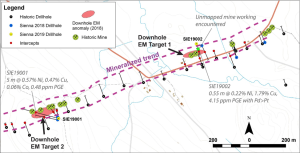Sienna Resources (SIE—TSX.v) (A1XCQ0 –FSE) (SNNAF—OTCBB) conducted a two-hole drill program in October at its Slättberg project in southern Sweden. This program targeted two electromagnetic (“EM”) anomalies detected by downhole surveys performed at the end of the 2018 drill program. One was detected in the vicinity of drill hole SIE-18-006 located at the west end of the trend of historic nickel mines, and one in the vicinity of drill hole SIE-18-003, near the center of the trend of mineralization (see Fig. 1).
Drill hole SIE-19-002 was drilled to test a strong EM response to the west of drill hole SIE-18-003 in the center of the trend of mineralization. Drill hole SIE-19-002 intersected a PGE rich vein 0.55 meters wide (from 88.0 m to 88.55 m), averaging 0.22% Ni, 1.79% Cu, and 4.15 ppm (4.15 g/t) PGE (4.05 g/t Pt vs 0.095 g/t Pd). Taking recent metal prices and assuming 100 percent recovery the hole returned 4.66g/t PdEq, 9.03g/t PtEq, 4.44% CuEq, and 1.72% NiEq. The unusual enrichment of PGE in this vein is notable and represents one of the highest values ever reported from the property. PGE contents seen in Sienna’s 2019 drill holes demonstrate strong PGE potential on the project. Drill hole SIE-19-002 also intersected unmapped mine workings at a depth of 70 meters. This demonstrates that nickel mineralization was mined at a larger scale than was indicated by historic records.
Jason Gigliotti, President of Sienna stated, “We are very pleased with the results of this drill program. The PGE numbers encountered were a very positive surprise and show that the system is more diverse than originally thought. These are some of the highest grades for PGE in the region. We also went through a previously unknown mined-out section. This indicates that the systems are potentially deeper as the mined-out section was near the limits of the known mining depths during the time that this area saw its mining production. We are now immediately formulating a plan for the next phase of work on this project.”
Drill hole SIE-19-001 was drilled to test the western anomaly. Several zones of sulfide mineralization were intercepted in the hole over a 28 meter interval from depths of 167 to 195 meters. This represents the broadest zone of sulfide mineralization ever intersected on the property. Sulfide mineralization was present as massive sulfide veins and in breccias, and is associated with, an unusually thick swarm of mafic dikes. The best intercept from within the zone of sulfide mineralization was 5.0 meters (from 167.75 m to 172.75 m) averaging 0.57% Ni, 0.47% Cu, 0.06% Co, and 0.48 ppm PGE*, or just over 1% Ni equivalent using current metal prices.
Textures in the sulfide intervals are suggestive of tectonic remobilization of sulfides from a nearby source. Multiple thick mafic dikes were also intercepted in SIE-19-001, which are not seen in surface exposures, nor in the shallow drill holes elsewhere in this area. The abundance of sulfide, higher PGE values, and a swarm of mafic dikes suggest that Sienna is moving closer to a source area for the sulfide mineralization and associated mafic intrusions as it drills to progressively deeper levels in the western target area.

*True thickness estimated to be 55-65% of reported interval
ᵻ True thickness estimated to be 25-40% of reported interval
The technical contents of this release were approved by Greg Thomson, PGeo, a qualified person as defined by National Instrument 43-101.
If you would like to be added to Sienna’s email list, please visit our website, email [email protected] for information or join our twitter account at @SiennaResources.
Contact Information
Tel: 1.604.646.6900
Fax: 1.604.689.1733
www.siennaresourcesinc.com
“Jason Gigliotti”
President, Director
Sienna Resources Inc.
Neither the TSX Venture Exchange nor its Regulation Services Provider (as that term is defined in the policies of the TSX Venture Exchange) accepts responsibility for the adequacy or accuracy of this press release.

